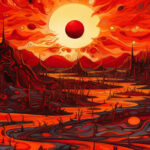If you haven’t read a Dune novel yet, you’re missing out on one of the greatest science fiction series of all time. The Dune universe is expansive, intricate, and full of unforgettable characters. But with over thirty novels written by Frank Herbert and other authors, where do you start? In this article, we’ll guide you through the best Dune books to read now, whether you’re a newcomer or a longtime fan.

Understanding the Dune Universe
Before diving into the novels themselves, it’s helpful to understand the basics of the Dune universe. Set 20,000 years in the future, humanity has formed a feudal society across the galaxy and relies on the spice melange, found only on the desert planet of Arrakis, for interstellar travel and longevity. The story follows the Atreides family as they navigate political intrigue and the religious cult of the Bene Gesserit.
The Dune universe is a complex and richly detailed world that has captivated readers for decades. One of the most fascinating aspects of the Dune universe is the intricate political and social systems that govern the galaxy. The feudal system, in which noble houses hold power over specific planets, is reminiscent of medieval Europe. However, the addition of advanced technology and the importance of the spice trade make the Dune universe a unique and compelling world.
The spice melange, found only on Arrakis, is a crucial element in the Dune universe. It has a variety of uses, including extending human life and enhancing mental abilities. The spice is also necessary for interstellar travel, as it allows ships to fold space and travel vast distances in an instant. The control of the spice trade is a major source of conflict in the Dune universe, and many of the characters in the series are motivated by a desire to control or protect the spice.
A Brief Introduction to the Dune Series
If you’re new to the Dune series, we recommend starting with the original trilogy by Frank Herbert. This includes Dune, Dune Messiah, and Children of Dune. These three books are widely regarded as the core of the series and introduce readers to the characters, themes, and world-building that make Dune so special.
The original trilogy follows the story of Paul Atreides, the son of a noble house who becomes embroiled in a power struggle on Arrakis. Through his journey, readers are introduced to the complex political and social systems of the Dune universe, as well as the powerful religious order of the Bene Gesserit.
Frank Herbert’s writing style is known for its intricate world-building and philosophical themes. The Dune series is no exception, and readers will find themselves contemplating questions of power, religion, and humanity throughout the novels.
The Chronology of the Dune Saga
However, if you prefer to read the series in chronological order, it’s important to note that the novels are not organized that way. The events of the original trilogy occur before the prequel novels, but the prequels were written later and provide additional context to the Dune universe. In this article, we’ll follow publication order.
The prequel novels, written by Brian Herbert and Kevin J. Anderson, explore the history of the Dune universe and provide insight into the events that led up to the original trilogy. These novels introduce new characters and expand on the existing lore of the Dune universe.
While some fans of the series prefer to read the prequels in chronological order, others argue that reading them after the original trilogy provides a more satisfying reading experience. Ultimately, the choice is up to the reader.
Regardless of how you choose to read the Dune series, one thing is certain: the universe created by Frank Herbert is a rich and fascinating world that has captivated readers for decades. From the complex political systems to the mystical powers of the Bene Gesserit, the Dune series is a must-read for any fan of science fiction.
The Original Dune Trilogy
Dune: The Groundbreaking Classic
Let’s start with the novel that started it all: Dune. Published in 1965, Dune won the Hugo and Nebula awards and established Herbert as a master of science fiction. The novel introduces readers to the desert world of Arrakis and its native Fremen people, as well as the political maneuverings of the Atreides and Harkonnen families. At the heart of the story is Paul Atreides, who becomes a messianic figure to the Fremen and sets in motion events that will shape the fate of the galaxy.
Dune is a complex and densely plotted novel, but it’s also a thrilling adventure story that explores themes of ecology, religion, and power. The world-building in Dune is unparalleled, with Herbert creating a rich and vivid universe that feels both alien and familiar. From the giant sandworms to the spice melange, Dune is full of fascinating concepts that will stay with you long after you finish the book.
One of the most interesting aspects of Dune is its exploration of power and its corrupting influence. The Atreides and Harkonnen families are locked in a struggle for control of Arrakis and its valuable spice, and both sides are willing to do whatever it takes to win. Paul Atreides, who initially wants nothing to do with the power struggle, is forced to confront his own desire for control and the consequences of his actions.
Dune Messiah: A Complex Sequel
Dune Messiah picks up the story several years after the events of Dune. Paul Atreides is now the emperor of the galaxy but faces assassination attempts and a crumbling economy. The novel is much quieter and introspective than its predecessor, focusing on the psychological fallout of Paul’s actions in the first book.
While Dune Messiah may not have the same level of action as Dune, it more than makes up for it with its exploration of Paul’s character. Paul is no longer the heroic figure he was in Dune; instead, he’s a broken man struggling to come to terms with the consequences of his actions. The novel also introduces new characters, such as the enigmatic Duncan Idaho, who add depth to the story.
One of the most interesting themes in Dune Messiah is the idea of sacrifice. Paul is faced with a difficult choice: he can either continue to rule the galaxy and perpetuate the cycle of violence, or he can sacrifice himself and bring about a new era of peace. The novel raises thought-provoking questions about the nature of power and the lengths people will go to hold onto it.
Children of Dune: The Struggle for Power
The third book in the original trilogy, Children of Dune, takes place several years after Dune Messiah. The twins Leto and Ghanima, children of Paul Atreides, are now teenagers and face threats to their family’s dynasty. Meanwhile, a secret society is working to resurrect their father.
Children of Dune is a satisfying conclusion to the original trilogy and brings many of the series’ threads together. It’s also a more action-packed novel than Dune Messiah, with epic battles and political intrigue. Leto and Ghanima are compelling characters in their own right, with Leto struggling to come to terms with his role as the heir to the Atreides dynasty and Ghanima grappling with her own psychic powers.
One of the most interesting themes in Children of Dune is the idea of destiny. Leto and Ghanima are both born with special abilities that set them apart from others, and they’re constantly reminded of their duty to their family and their people. The novel raises questions about free will and whether people are truly in control of their own destinies.
The Later Dune Novels
God Emperor of Dune: A New Era
The later Dune novels are more divisive among fans and critics, but there are still some gems to be found. God Emperor of Dune is often cited as the best of the later novels, as it takes the series in a bold new direction. A millennia after the events of the original trilogy, Leto II, the son of Paul Atreides, has become a giant worm-human hybrid and rules the universe with an iron fist.
God Emperor of Dune is a strange and philosophical novel that delves into questions of governance and the nature of humanity. It’s not for everyone, but if you’re interested in Herbert’s more esoteric ideas, this is the novel for you.
Heretics of Dune: The Return of the Bene Gesserit
Heretics of Dune takes place several centuries after God Emperor of Dune and follows a new cast of characters, including the Bene Gesserit organization and the Tleilaxu race. The novel is more action-oriented than God Emperor and explores themes of rebellion and the dangers of religious fanaticism.
Chapterhouse: Dune: The Final Chapter
The last novel written by Frank Herbert before his death, Chapterhouse: Dune picks up where Heretics of Dune left off. The Bene Gesserit face eradication at the hands of a mysterious and powerful enemy. The novel ends on a cliffhanger that Herbert intended to resolve in a seventh novel, but unfortunately, he passed away before he could complete it.
Prequels and Spin-offs
The Legends of Dune Trilogy
If you’re interested in learning more about the history of the Dune universe, check out the Legends of Dune trilogy by Brian Herbert and Kevin J. Anderson. These novels take place thousands of years before the events of Dune and explore the origins of the Bene Gesserit and the Butlerian Jihad, a conflict between humanity and artificial intelligence. The trilogy is action-packed and full of epic space battles.
The Prelude to Dune Trilogy
Another prequel trilogy by Brian Herbert and Kevin J. Anderson, the Prelude to Dune novels take place several decades before the events of Dune and explore the early years of the Atreides-Harkonnen feud. The trilogy also introduces readers to some of the most beloved characters of the series, including Duke Leto and Lady Jessica. If you’re a fan of political intrigue and character development, this is the trilogy for you.
The Heroes of Dune Series
The Heroes of Dune series by Brian Herbert and Kevin J. Anderson focuses on some of the lesser-known characters of the Dune universe, including the family of House Vernius and the sisterhood of the Bene Gesserit. The series is action-packed and explores themes of redemption and sacrifice.
Conclusion
Whether you’re a longtime fan or a newcomer, there’s never been a better time to explore the Dune universe. We hope this guide has given you a starting point for your journey through the series. And who knows, maybe you’ll even find your next favorite book.
FAQs
Who wrote the Dune books?
Frank Herbert was the author of the Dune books.
Are the new Dune films good?
The new Dune films are excellent adaptations of the original books. Using better technology than the previous Dune films, these films are more immersive, use better cinematography, and follow the storyline with accuracy.
What is the Dune series about?
Dune follows Paul Atreides as he fights for Arrakis, the desert planet that needs to be saved from rival armies and noble houses. It’s the story of a fight for power and resources and provides important messages about societal structures.
- The 11 Best Books About Cats You Should Read - January 16, 2024
- The 9 Best Books on Building Confidence - January 16, 2024
- Discover the 10 Best Books on the Brain - January 16, 2024

